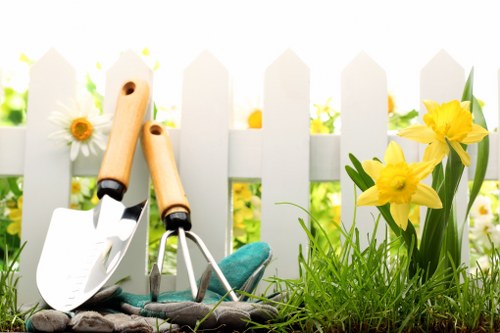Garden Fence Replacement in Sidcup: A Comprehensive Guide

Is your garden fence in Sidcup showing signs of wear and tear? Whether it’s old, damaged, or simply not meeting your aesthetic needs, replacing your garden fence can significantly enhance the beauty and security of your outdoor space.
In this guide, we’ll explore everything you need to know about garden fence replacement in Sidcup. From choosing the right materials to understanding local regulations, we’ve got you covered.
Replacing a garden fence is not just about aesthetics; it’s also about functionality and security. A new fence can provide better privacy, keep unwanted visitors out, and even increase the value of your property.
Why Replace Your Garden Fence?

There are several reasons why homeowners in Sidcup consider replacing their garden fences:
- Age and Wear: Over time, materials like wood can rot, metal can rust, and paint can peel.
- Damage: Accidents, weather conditions, and wear and tear can cause damage to your fence.
- Improved Aesthetics: A new fence can complement your garden's design and enhance curb appeal.
- Security: Upgrading to a more secure fence can protect your property from intruders and pests.
- Privacy: A higher or thicker fence can provide better privacy for your outdoor activities.
Understanding the reasons behind replacing your fence can help you make informed decisions about the type and style that best suits your needs.
Choosing the Right Fence Material

One of the first decisions you’ll need to make when replacing your garden fence is choosing the right material. Different materials offer various benefits, so it’s essential to consider your specific needs and preferences.
Wood Fences
Wooden fences are a popular choice due to their natural beauty and versatility. They can be painted or stained to match your garden’s aesthetic.
Pros:
- Natural appearance
- Highly customizable
- Variety of styles available
Cons:
- Requires regular maintenance
- Susceptible to rot and pests
- Shorter lifespan compared to other materials
Metal Fences
Metal fences, such as those made from wrought iron or aluminum, are known for their durability and low maintenance needs.
Pros:
- Highly durable
- Low maintenance
- Provides excellent security
Cons:
- Limited privacy
- Can be more expensive than wood
- Susceptible to rust if not properly treated
Composite Fences
Composite fences are made from a blend of wood fibers and plastic, offering the look of wood without the associated maintenance.
Pros:
- Low maintenance
- Resistant to rot and pests
- Environmentally friendly
Cons:
- Can be more expensive upfront
- Limited color options
- May not be as strong as metal fences
The Fence Replacement Process

Replacing your garden fence involves several steps, from planning and selecting materials to installation and finishing touches. Here’s a detailed overview of the process:
1. Assess Your Current Fence
Start by evaluating the condition of your existing fence. Identify any areas that need repair or replacement and determine if you need to replace the entire fence or just specific sections.
2. Determine Your Needs
Consider what you want to achieve with your new fence. Are you looking for more privacy, better security, or a design upgrade? Your goals will influence the type of fence you choose.
3. Choose the Right Material and Style
Select a material and style that aligns with your needs and complements your garden’s aesthetic. Consider factors like durability, maintenance requirements, and cost.
4. Obtain Necessary Permits
In Sidcup, certain types of fences may require planning permission, especially if you live in a conservation area or a listed building. Check with the local council to ensure you comply with all regulations.
5. Prepare the Area
Clear the area where the new fence will be installed. Remove any obstacles and ensure the ground is level and stable.
6. Installation
Depending on your expertise, you can install the fence yourself or hire a professional. Professional installation ensures the fence is secure and properly aligned.
7. Finishing Touches
Once the fence is installed, add any finishing touches such as painting, staining, or adding decorative elements to match your garden’s design.
Local Regulations and Permits in Sidcup

Before embarking on your garden fence replacement project in Sidcup, it’s crucial to understand the local regulations and permit requirements. Non-compliance can result in fines or orders to remove unauthorized structures.
Planning Permission
Generally, fences up to 2 meters in height do not require planning permission. However, if your fence exceeds this height or if you live in a conservation area, you may need to apply for a permit.
Building Regulations
Building regulations pertain to the structural integrity and safety of the fence. Ensuring your fence meets these standards is essential for both safety and legal reasons.
Boundary Agreements
If you share a boundary with a neighbor, it’s advisable to discuss your fence replacement plans with them. Mutual agreement can prevent disputes and ensure the fence is positioned correctly.
Materials Restrictions
Some areas may have restrictions on the types of materials you can use for your fence. Check with the local council to ensure your chosen material is permitted.
Cost Factors in Garden Fence Replacement
The cost of replacing a garden fence in Sidcup can vary widely based on several factors:
- Material: Wood, metal, and composite fences have different price points.
- Size: The length and height of the fence will affect the overall cost.
- Labor: Professional installation costs can vary depending on the complexity of the job.
- Permits: Obtaining necessary permits may add to the cost.
- Finishing: Painting, staining, and additional decorative elements can increase expenses.
On average, homeowners in Sidcup can expect to pay between £500 and £3,000 for garden fence replacement, depending on these factors.
Budgeting Tips
- Get multiple quotes: Compare prices from different contractors to find the best deal.
- Choose cost-effective materials: Opt for materials that offer durability and aesthetics within your budget.
- Plan for unexpected costs: Set aside a contingency fund for any unforeseen expenses.
Hiring a Professional vs. DIY
Deciding whether to hire a professional or undertake the fence replacement yourself depends on your skills, budget, and the complexity of the project.
Professional Installation
Hiring a professional ensures that the fence is installed correctly and complies with local regulations. Professionals have the expertise and tools needed for a seamless installation.
Benefits:
- Expertise and experience
- Time-saving
- Guaranteed quality
Drawbacks:
- Higher cost
- Less control over the process
DIY Replacement
Replacing your fence yourself can be a cost-effective option if you have the necessary skills and tools. It also allows you to have complete control over the project.
Benefits:
- Lower costs
- Personal satisfaction
- Flexibility in design and timing
Drawbacks:
- Time-consuming
- Requires significant effort and skill
- Potential for mistakes without professional help
Maintenance Tips for Longevity
To ensure your new garden fence remains in excellent condition, regular maintenance is essential. Here are some tips to extend the life of your fence:
- Regular Cleaning: Keep your fence free from dirt, moss, and debris by cleaning it regularly.
- Inspect for Damage: Periodically check for signs of wear, such as loose boards or rust spots.
- Protective Coatings: Apply sealants, paint, or stain to protect the fence from the elements.
- Prevent Pests: Treat wooden fences to prevent termite and pest infestations.
- Repair Promptly: Address any damage immediately to prevent it from worsening.
Proper maintenance not only keeps your fence looking good but also ensures it remains functional and secure for years to come.
Local Areas Near Sidcup for Garden Fence Replacement
Sidcup is surrounded by several charming areas, each with its unique characteristics that may influence your garden fence replacement project. Here are some of the closest areas to Sidcup:
- New Eltham Known for its parks and residential areas, New Eltham offers a variety of fencing styles to match its scenic surroundings.
- Penge: With its vibrant community, Penge residents often prefer stylish and durable fences that complement the local architecture.
- Chislehurst This area’s historic charm means fences often need to blend with traditional and period properties.
- Eltham: Eltham’s mix of urban and suburban settings allows for diverse fencing options, from modern to classic designs.
- Welling In Welling, practical and cost-effective fence solutions are popular among homeowners.
- Lower St Mary: This area values privacy and strength in their fences, often opting for taller and more robust materials.
- Lee Lee residents might choose decorative fences that add character to their gardens without compromising on security.
- Bexleyheath Bexleyheath’s bustling environment means fences need to be both functional and aesthetically pleasing.
- Blackfen Known for its quiet neighborhoods, Blackfen homeowners often seek fences that enhance privacy and tranquility.
- Welling Green: This area favors eco-friendly fencing options, reflecting the community’s commitment to sustainability.
- Crayford Crayford combines commercial and residential zones, so fences here need to be versatile and durable.
- Tunbridge: Tunbridge offers a range of fencing styles, from traditional wood to modern metal designs, catering to diverse tastes.
Choosing the Right Style for Your Garden
The style of your fence should complement the overall design of your garden and home. Here are some popular fencing styles to consider for your Sidcup garden:
Privacy Fences
Designed to block the view from outside, privacy fences provide a secluded outdoor space. They are typically tall and solid, using materials like wood or composite panels.
Picket Fences
Picket fences offer a classic and charming look. They are ideal for decorative purposes and can add character to your garden without compromising too much on privacy.
Metal Fences
Metal fences, such as wrought iron or aluminum, are known for their durability and security. They are a great option for modern gardens and can be customized with intricate designs.
Garden Rail Fences
These fences consist of two horizontal rails connected by vertical posts, offering a semi-private boundary. They are ideal for smaller gardens and provide a neat, structured appearance.
Vinyl Fences
Vinyl fences are low-maintenance and come in various styles and colors. They are resistant to weather and pests, making them a practical choice for garden fencing.
Environmental Considerations
When replacing your garden fence, it’s important to consider the environmental impact of your choices. Sustainable fencing options not only reduce your carbon footprint but also contribute to a healthier ecosystem.
Eco-Friendly Materials
Choose materials that are renewable or recycled, such as sustainably sourced wood or recycled metal. Composite fences made from recycled materials are also an excellent choice.
Energy Efficiency
Installing a fence can also contribute to energy efficiency by providing shade and reducing heat gain in your garden area.
Natural Landscaping
Consider integrating your fence with natural landscaping elements like climbing plants or hedges. This approach not only enhances the beauty of your garden but also supports local wildlife.
Enhancing Curb Appeal
A well-chosen fence can significantly enhance the curb appeal of your home. Here are some tips to make the most of your garden fence replacement:
- Match Your Home’s Style: Ensure your fence complements the architectural style of your home, whether it’s traditional, modern, or something in between.
- Choose the Right Color: Select colors that harmonize with your garden and house. Neutral tones can offer a timeless look, while bold colors can make a statement.
- Add Decorative Elements: Incorporate decorative posts, finials, or lattice panels to add character and detail to your fence.
- Maintain Consistency: Ensure uniformity in the height and spacing of fence panels for a cohesive appearance.
- Install Proper Lighting: Outdoor lighting can highlight your fence and enhance the overall aesthetic of your garden at night.
Security Enhancements
A secure fence is essential for protecting your property and loved ones. Here are some ways to enhance the security of your garden fence in Sidcup:
Locking Mechanisms
Install secure locks on any gates to prevent unauthorized access. Consider using high-quality padlocks or smart locks for added security.
Height and Strength
A taller and sturdier fence makes it harder for intruders to climb over or break through. Materials like metal and composite offer greater strength compared to wood.
Anti-Climb Features
Add anti-climb spikes or smooth surfaces to deter climbing. These features make it more challenging for potential trespassers.
Integrated Security Systems
Integrate your fence with security cameras and alarm systems. This provides real-time monitoring and quick response in case of a breach.
Regular Maintenance
Keep your fence in top condition by addressing any damage promptly. A well-maintained fence is a strong one, reducing vulnerabilities.
Impact on Property Value
Investing in a quality garden fence can positively impact the value of your property. A modern, well-maintained fence enhances the overall appeal and can attract potential buyers.
First Impressions Matter
A beautiful fence creates a positive first impression, making your property more inviting and desirable.
Perceived Value
High-quality fencing materials and designs signal to buyers that the property is well cared for and thoughtfully designed.
Functional Benefits
A fence that offers privacy, security, and aesthetic appeal adds functional benefits that enhance property value.
Competitive Edge
In a competitive real estate market like Sidcup, a standout garden fence can give your property an edge over others.
Conclusion
Garden fence replacement in Sidcup is an investment that can significantly enhance the beauty, security, and value of your property. By carefully selecting the right materials, understanding local regulations, and maintaining your fence, you can enjoy a stunning and functional outdoor space for years to come.
Whether you choose to hire a professional or take on the project yourself, planning and execution are key to a successful fence replacement. Consider the unique features of Sidcup and its surrounding areas to ensure your new fence meets your needs and complements your garden perfectly.
Frequently Asked Questions
1. Do I need planning permission to replace my garden fence in Sidcup?
Generally, fences up to 2 meters in height do not require planning permission. However, if your fence exceeds this height or if you reside in a conservation area, you may need to obtain a permit from the local council.
2. What is the most durable fencing material for gardens in Sidcup?
Metal fences, such as wrought iron or aluminum, are among the most durable options. They require minimal maintenance and can withstand various weather conditions, making them a long-lasting choice.
3. Can I install a garden fence myself, or should I hire a professional?
While DIY installation can save money, hiring a professional ensures proper installation and compliance with local regulations. If you have the necessary skills and tools, a DIY approach is feasible, but professional assistance is recommended for best results.
4. How much does garden fence replacement cost in Sidcup?
The cost varies based on materials, size, and labor. On average, homeowners in Sidcup can expect to spend between £500 and £3,000 for garden fence replacement.
5. How can I maintain my new garden fence to ensure its longevity?
Regular cleaning, inspecting for damage, applying protective coatings, preventing pests, and promptly repairing any issues are essential maintenance steps to keep your fence in excellent condition.